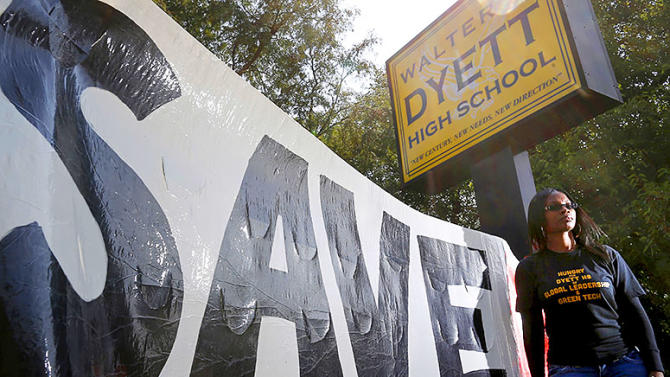Dyett Hunger Strike for a Progressive School Vision
Dyett GlobalAndGreen Tech HSProposal
===================================
Parents’ Hunger Strike Reveals Flaws in Chicago’s Education Reforms
It’s a drastic, painful,
potentially fatal tactic associated with third-world political movements
calling attention to brutal regimes, or history lessons about legendary
protest leaders such as Mahatma Gandhi and Cesar Chavez.
Yet activists
on Chicago’s hardscrabble South Side are entering their second month of a
hunger strike, launched to draw attention to the plight of a storied but downtrodden neighborhood school scheduled to close next year.
The activists say they launched the strike because city leaders, including Mayor Rahm Emanuel, have repeatedly turned a deaf ear
to their complaints about the fate of Walter H. Dyett High School in
the historic majority-black Bronzeville neighborhood. Emanuel’s
administration, they say, has also ignored their demand for a say in
what happens to their community’s school—including their suggestions to
junk plans to turn Dyett into a music and arts school and instead create an academy for kids who want careers in the future-facing high-tech, green-energy field.
“The
community said they wanted Dyett Global Leadership and Green Technology
High School,” Jitu Brown, one of the hunger strikers, told Chicago’s WTTW-TV
on Wednesday, the 31st day of the protest. “It’s really frustrating
that taxpayers have to go to this length when you realize that you’ve
been rendered voiceless.”
 |
| Hunger-strikers Irene Robinson and Jitu Brown at Dyett High School on Wednesday. |
While
the “Fight for Dyett” movement has adopted desperate measures for what
it sees as a desperate time, the standoff between the protesters and the
powers that be is a microcosm of similar conflicts playing out
nationwide.
Several studies have shown that when urban school districts from Washington, D.C., to Oakland, California, have had to balance the books by closing low-enrollment, poorly-performing schools, black communities are hit the hardest. But city and school officials say the enrollment numbers don’t lie; In Chicago, Dyett High’s class of 2015 had just 15 students.
But analysts say families displaced by gentrification, as well as the appeal of charter schools, is artificially driving down enrollment, undermining schools like Dyett, named for an esteemed African American music teacher whose pupils included jazz legends Nat King Cole and Dinah Washington.
“People have gotten to a level of desperation,” said Richard Gray, director of community organizing and engagement at Brown University’s Annenberg Institute for School Reform. The decision to close Dyett without their input, said Gray, felt to Bronzeville community leaders “like an attack on their schools and their teachers” and proof that Rahm Emanuel “disdains their community.”
Gentrification
is “definitely” a factor in the standoff in Chicago, according to Gray.
For several decades, “massive real-estate speculation” has forced the displacement
of a substantial portion of residents, he said. To make affordable
communities more attractive, city education administrators bypassed
plans to revive traditional public schools and joined the parade toward
publicly funded charter schools.
Officials
“are building these charter schools and boutique [magnet] schools for
affluent whites,” Gray said. “These things accumulate.”
 |
| Hunger strikers at Dyett High School at the start of a press conference. |
Gary Orfield, an education and city planning professor at the University of California, Los Angeles, and codirector of the school’s
Civil Rights Project, agreed with Gray’s assessment of the situation at
Dyett. A former Chicago resident, Orfield said the breakdown in
communication reflects “negative racial change” in the city, and he
wouldn’t be surprised if protesters in other cities mirrored the
hunger-strike strategy.
“I
hope that reason takes hold, and they negotiate a settlement, and these
people don’t die,” Orfield said. “None of these things have been handled
well.”
Ultimately, however,
he said, the hunger strike could prove to be an opportunity for Emanuel,
who as a congressman and chief of staff for President Barack Obama
purportedly advised his staff to never let a crisis go to waste.
“This is the kind of crisis that could change things,” Orfield said.

Manipur HSLC Date Sheet 2018
ReplyDeleteMeghalaya 12th Time Table 2018
Mizoram HSLC Date Sheet 2018
MP Board 12th Date Sheet 2018